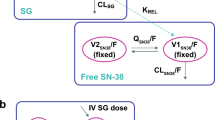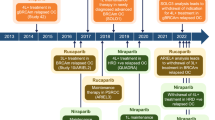Abstract
Purpose
Trifluridine/tipiracil (FTD/TPI) is approved for advanced colorectal and gastric/gastroesophageal cancer; however, data in patients with renal impairment (RI) are limited. This phase I study evaluated FTD/TPI in patients with advanced solid tumors and varying degrees of RI to develop dosing guidance.
Methods
Patients were enrolled into normal renal function (CrCl ≥ 90 mL/min), mild RI (CrCl 60–89 mL/min), or moderate RI (CrCl 30–59 mL/min) cohorts and administered the recommended FTD/TPI dose (35 mg/m2 twice daily, days 1–5 and 8–12; 28-day cycle). Based on interim pharmacokinetics/safety data, patients with severe RI (CrCl 15–29 mL/min) were enrolled and received FTD/TPI 20 mg/m2 twice daily.
Results
Forty-three patients (normal renal function [n = 12]; mild RI [n = 12]; moderate RI [n = 11]; severe RI [n = 8]) were enrolled and treated. At steady state, compared to values in patients with normal renal function, FTD area under the curve (AUC) was not significantly different in patients with RI, but TPI AUC was significantly higher and increased with RI severity. FTD/TPI safety profile was consistent with prior experience, but grade ≥ 3 adverse events (AEs) were more frequent in the RI cohorts (83.3% [mild], 90.9% [moderate], 75.0% [severe], and normal [50.0%]). Hematologic AEs (anemia and neutropenia) were more frequent with RI. Overall, seven patients discontinued because of unrelated, nonhematologic AEs.
Conclusion
FTD/TPI is safe and tolerable at the recommended 35 mg/m2 dose in patients with mild/moderate RI and at the reduced 20 mg/m2 dose in patients with severe RI.
Trial registration
NCT02301117, registration date: November 21, 2014.


Similar content being viewed by others
Availability of data and material
Data generated or analyzed during this study are on file with Taiho Oncology, Inc., and Taiho Pharmaceuticals Co., Ltd., and are not publicly available. Inquiries about data access should be sent to th-datasharing@taiho.co.jp.
Code availability
Phoenix WinNonlin® software (Version 7.0, Certara LP; Princeton, New Jersey, USA) or SAS® statistical software, version 9.3 or a later version.
References
Emura T, Murakami Y, Nakagawa F, Fukushima M, Kitazato K (2004) A novel antimetabolite, TAS-102 retains its effect on FU-related resistant cancer cells. Int J Mol Med 13(4):545–549
Cleary JM, Rosen LS, Yoshida K, Rasco D, Shapiro GI, Sun W (2017) A phase 1 study of the pharmacokinetics of nucleoside analog trifluridine and thymidine phosphorylase inhibitor tipiracil (components of TAS-102) vs trifluridine alone. Invest New Drugs 35(2):189–197
Bendell JC, Rosen LS, Mayer RJ et al (2015) Phase 1 study of oral TAS-102 in patients with refractory metastatic colorectal cancer. Cancer Chemother Pharmacol 76(5):925–932
Doi T, Ohtsu A, Yoshino T et al (2012) Phase I study of TAS-102 treatment in Japanese patients with advanced solid tumours. Br J Cancer 107(3):429–434
Hong DS, Abbruzzese JL, Bogaard K et al (2006) Phase I study to determine the safety and pharmacokinetics of oral administration of TAS-102 in patients with solid tumors. Cancer 107(6):1383–1390
Overman MJ, Varadhachary G, Kopetz S et al (2008) Phase 1 study of TAS-102 administered once daily on a 5-day-per-week schedule in patients with solid tumors. Invest New Drugs 26(5):445–454
Scagliotti G, Nishio M, Satouchi M et al (2016) A phase 2 randomized study of TAS-102 versus topotecan or amrubicin in patients requiring second-line chemotherapy for small cell lung cancer refractory or sensitive to frontline platinum-based chemotherapy. Lung Cancer 100:20–23
Lee JJ, Seraj J, Yoshida K et al (2016) Human mass balance study of TAS-102 using (14)C analyzed by accelerator mass spectrometry. Cancer Chemother Pharmacol 77(3):515–526
Taiho Oncology (2019) LONSURF (trifluridine and tipiracil) tablets, for oral use [prescribing information]. Taiho Oncology Inc, Princeton, NJ
Mayer RJ, Van Cutsem E, Falcone A et al (2015) Randomized trial of TAS-102 for refractory metastatic colorectal cancer. N Engl J Med 372(20):1909–1919
Shitara K, Doi T, Dvorkin M et al (2018) Trifluridine/tipiracil versus placebo in patients with heavily pretreated metastatic gastric cancer (TAGS): a randomised, double-blind, placebo-controlled, phase 3 trial. Lancet Oncol 19(11):1437–1448
Launay-Vacher V, Janus N, Deray G (2016) Renal insufficiency and cancer treatments. ESMO Open 1(4):e000091
Launay-Vacher V, Oudard S, Janus N et al (2007) Prevalence of renal insufficiency in cancer patients and implications for anticancer drug management: the renal insufficiency and anticancer medications (IRMA) study. Cancer 110(6):1376–1384
National Kidney Foundation (2002) K/DOQI clinical practice guidelines for chronic kidney disease: evaluation, classification, and stratification. Am J Kidney Dis 39(2 Suppl 1):S1-266
US FDA Guidance Document (2010) Pharmacokinetics in patients with impaired renal function: study design, data analysis and impact on dosing and labeling. https://www.fda.gov/regulatory-information/search-fda-guidance-documents/pharmacokinetics-patients-impaired-renal-function-study-design-data-analysis-and-impact-dosing-and. Accessed 27 April 2021
Yoshino T, Mizunuma N, Yamazaki K et al (2012) TAS-102 monotherapy for pretreated metastatic colorectal cancer: a double-blind, randomised, placebo-controlled phase 2 trial. Lancet Oncol 13(10):993–1001
Mayer RJ, Ohtsu A, Yoshino T et al (2016) Efficacy and safety results in patients with impaired renal and hepatic function in the RECOURSE trial. J Clin Oncol 34(15_suppl):3547
George B, Cutsem EV, Hochster HS et al (2020) Analysis of hematologic adverse events (HeAEs) in trifluridine/tipiracil (FTD/TPI)-treated patients (pts) with or without renal/hepatic impairment (RI/HI): Pooled safety analyses from TAGS and RECOURSE. J Clin Oncol 38(4_suppl):145
Saif MW, Rosen L, Rudek MA et al (2019) Open-label study to evaluate trifluridine/tipiracil safety, tolerability and pharmacokinetics in patients with advanced solid tumours and hepatic impairment. Br J Clin Pharmacol 85(6):1239–1246
Ibrahim S, Honig P, Huang SM, Gillespie W, Lesko LJ, Williams RL (2000) Clinical pharmacology studies in patients with renal impairment: past experience and regulatory perspectives. J Clin Pharmacol 40(1):31–38
Honda H, Hosaka N, Ganz T, Shibata T (2019) Iron metabolism in chronic kidney disease patients. Contrib Nephrol 198:103–111
Cleary JM, Mayer RJ, Van Cutsem E et al (2015) Population pharmacokinetic (PK) analysis of TAS-102 in patients (pts) with metastatic colorectal cancer (mCRC): results from 3 phase 1 trials and the phase 3 RECOURSE trial. J Clin Oncol 33(15_suppl):2579
Acknowledgements
This study was sponsored by Taiho Oncology, Inc., and Taiho Pharmaceutical Co., Ltd. The authors acknowledge Dr. Kenichiro Yoshida for the study design and regression model analysis. Medical writing and editorial assistance were provided by Vasupradha Vethantham, PhD, and Jennifer Robertson, PhD, of Ashfield Healthcare Communications (Lyndhurst, NJ, USA) and funded by Taiho Oncology, Inc.
Funding
This study was funded by Taiho Oncology, Inc., and Taiho Pharmaceutical Co. Ltd.
Author information
Authors and Affiliations
Contributions
M.W.S., L.R., I.Y., K.H., and Y.H. were involved in the study design. M.W.S., C.R.B., M.G.F., W.S., L.P., S.K., T.J.G., M.A.R., D.R.S., J.S., V.S., B.Z., and L.R. contributed to data collection. M.W.S., L.R., I.Y., K.A.B., K.H., and Y.H were involved in data analysis and/or interpretation. All authors meet the criteria for authorship as recommended by the International Committee of Medical Journal Editors. All authors take full responsibility for the scope, direction, content of, and editorial decisions relating to the manuscript, were involved at all stages of development, and have approved the submitted manuscript.
Corresponding author
Ethics declarations
Conflict of interest
M.W.S. reports research funding from Incyte, Lexicon, NGM Bio, Nouscom, Tesaro, and Yivia. C.R.B. is part of the speaker bureau for Taiho Oncology Inc. M.G.F. received research grant funding (to institution) from Amgen, AstraZeneca, and Novartis; has served on the advisory board of Amgen, Array Biopharma, Bayer, and Pfizer; is part of the speakers bureau for Amgen and Guardant360, and reports honoraria from Amgen. M.A.R. received research funding from Taiho Oncology, Inc, during the conduct of the study and from Celgene Corporation and the National Cancer Institute, outside the submitted work. K.H., I.Y., K.A.B., and Y.H are employees of Taiho Oncology, Inc. K.A.B. is a former employee and a stockholder of Eli Lilly. L.R. received research funding from Taiho Oncology, Inc. W.S., L.P., S.K., T.J.G., D.R.S., J.S., V.S., and B.Z have no financial disclosures to report.
Ethics approval
This study was performed in line with the Declaration of Helsinki. Approval was granted from the review board or ethics committee of each institution.
Consent to participate
Informed consent was obtained from all individual participants included in the study.
Additional information
Publisher's Note
Springer Nature remains neutral with regard to jurisdictional claims in published maps and institutional affiliations.
Supplementary Information
Below is the link to the electronic supplementary material.
Rights and permissions
About this article
Cite this article
Saif, M.W., Becerra, C.R., Fakih, M.G. et al. A phase I, open-label study evaluating the safety and pharmacokinetics of trifluridine/tipiracil in patients with advanced solid tumors and varying degrees of renal impairment. Cancer Chemother Pharmacol 88, 485–497 (2021). https://doi.org/10.1007/s00280-021-04308-z
Received:
Accepted:
Published:
Issue Date:
DOI: https://doi.org/10.1007/s00280-021-04308-z




